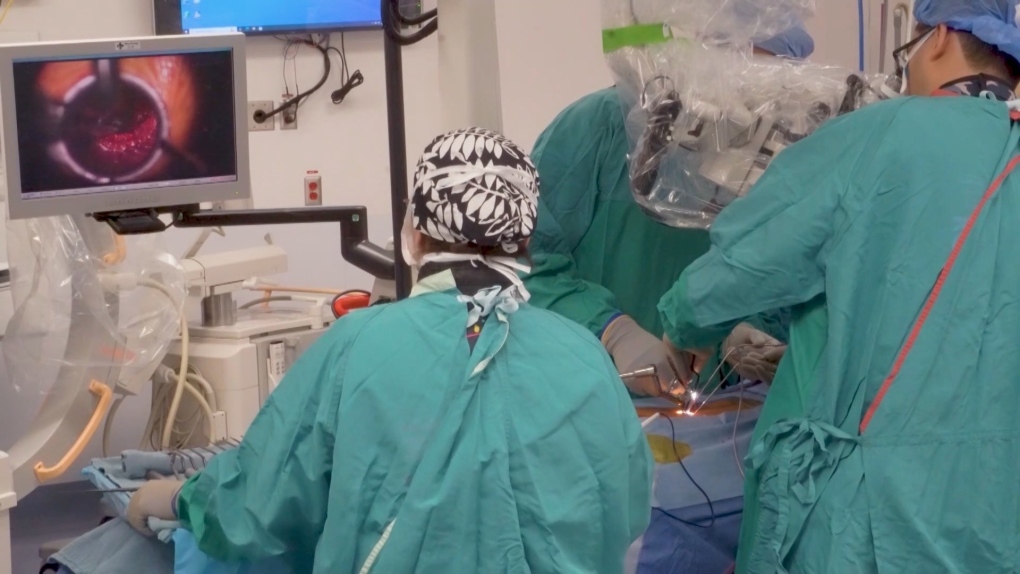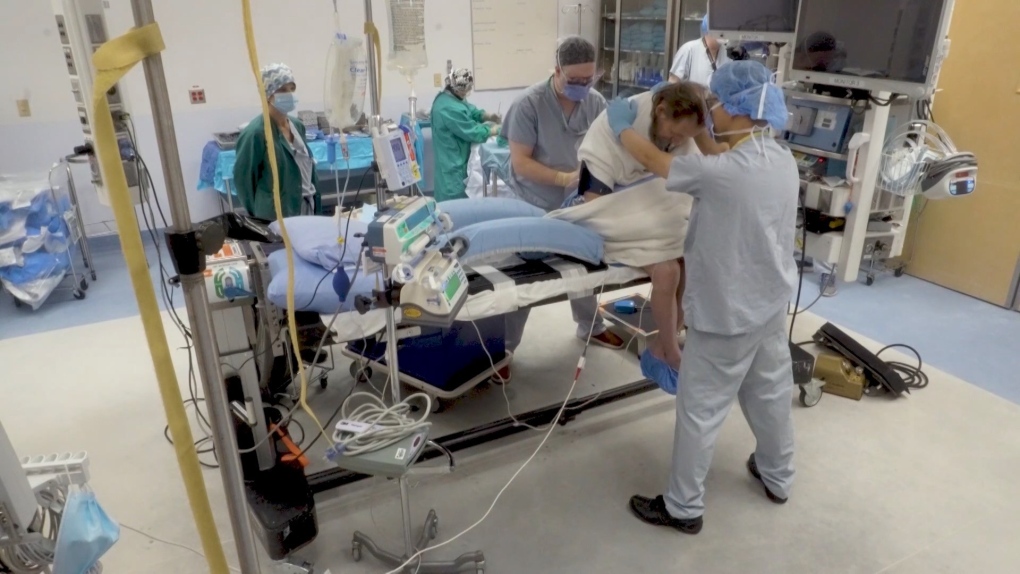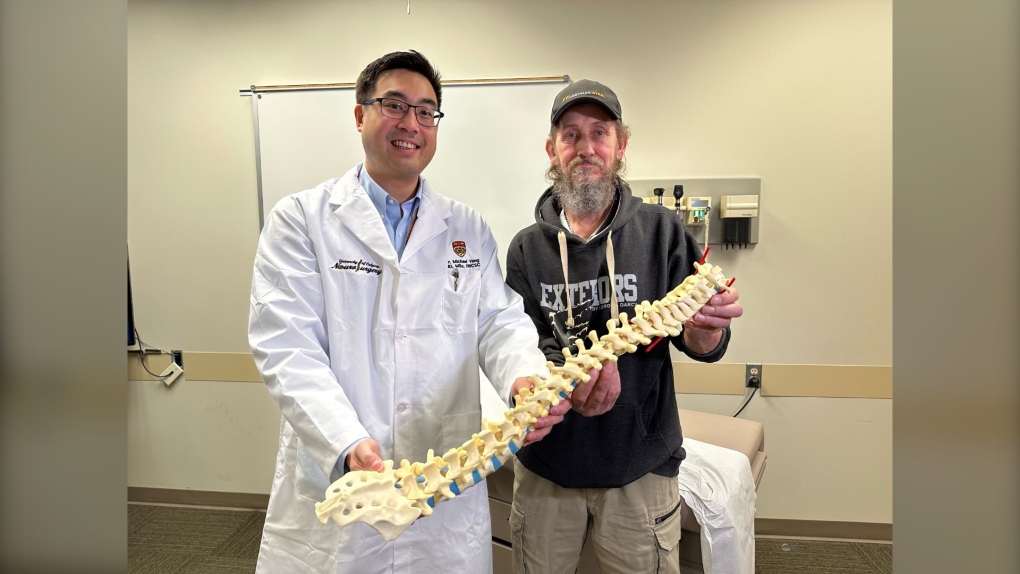Calgary doctor performs spine surgery on conscious patient
 Todd Bene, who has been dealing with chronic lower back and leg pain, was wide awake for a discectomy to remove the damaged part of a herniated disc.
Todd Bene, who has been dealing with chronic lower back and leg pain, was wide awake for a discectomy to remove the damaged part of a herniated disc.
(A previous version of this story stated this procedure was believed to have been the first of its kind performed in Canada, based on information provided by Alberta Health Services. That belief was genuine, but incorrect – spine surgery on awake patients has been performed previously in Canada over the years, albeit infrequently. CTV Calgary has revised this story and apologizes for any confusion caused.)
A Calgary doctor who recently performed a spinal surgery on an awake patient hopes to expand this technique in Alberta to ease pressure on the health-care system.
"This is just the first step of a long journey that we have, the plan that we have to help more Albertans," said Dr. Michael Yang, a spine surgeon at Foothills Medical Centre.
Last month, Yang performed a discectomy to remove the damaged part of a herniated disc in the spine, on a patient who was conscious.
Todd Bene, the man on the operating table, got the surgery to relieve his chronic lower back and leg pain.
"I thought, well, I'll try anything once," he said. "It was kind of cool. You know, I didn't feel much. Every once in a while, you would feel a little something."
 The surgery took about 55 minutes and Todd Bene was able to go home less than five hours later.
The surgery took about 55 minutes and Todd Bene was able to go home less than five hours later.
The surgery took about 55 minutes and Bene was able to go home less than five hours later. The next day, he was up cooking breakfast for his grandkids and even made a trip to IKEA.
"It was just night and day for the pain," he said. "I was just so surprised when I got up the first time after the surgery and also standing up straight."
Bene had a previous heart attack, heart failure and coronary artery disease, so Yang thought putting him under general anesthetic would be too risky.
Instead, he chose to perform the surgery without it and only with a local anesthetic — something he learned while studying at the University of Miami.
"The patients have less pain after surgery, less nausea, less vomiting after surgery. Patients are able to get up much quicker and walk around and thereby, facilitating their recovery," Yang said.
"Also, without general anesthetic, it causes less stress on the heart and lungs, so there's less risk of developing complications during the operation."
 Todd Bene, who has been dealing with chronic lower back and leg pain, was wide awake for a discectomy to remove the damaged part of a herniated disc.
Todd Bene, who has been dealing with chronic lower back and leg pain, was wide awake for a discectomy to remove the damaged part of a herniated disc.
The surgical team and neuroanesthesiologists worked together to sedate Bene just enough so it wouldn't hurt and he'd be able to communicate if it did.
"So we minimize the harm that we could potentially cause on a patient during the surgery," Yang said. "The surgery itself is not super innovative, but it's putting a team together to be able to do it awake that is innovative."
Yang says he plans to perform more procedures, and hopes to use this method for more complex surgeries, like spinal fusions.
He says spinal fusions, surgery to connect two or more bones in any part of the spine, typically require a two-to-three-day hospital stay, but with this method, the patient could go home the same day.
"This can really help reduce health-care utilization while maintaining excellent outcomes for our patients and be able to help more Albertans get the surgery they need in a more timely fashion," Yang said.
 Dr. Michael Yang hopes the surgery on Todd Bene will create opportunities to perform more complex surgeries — like spinal fusions — using this technique.
Dr. Michael Yang hopes the surgery on Todd Bene will create opportunities to perform more complex surgeries — like spinal fusions — using this technique.
However, Yang warns "awake surgery" isn’t for everyone. He advises against doing it on patients who are obese, have anxiety or require a longer surgery because there can be more risks.
Meanwhile, Bene has been off work for six weeks and is about to start physiotherapy. He has advice for other patients:
"Just don't be scared of it. It'll change your life."
CTVNews.ca Top Stories

What's a Barnacle? It's yellow, sticks and screams if you try to pry it off your car
Barnacles, bright yellow devices used to make sure parking scofflaws pay their tickets, could soon be making their way to cities across Canada.
Verdun Airbnb listing taken down amid complaints, fines and frustration from neighbours
An Airbnb in Montreal's Verdun borough was the source of much frustration from neighbours who say there were constant parties at the location. It has been taken down from the app, but housing advocates remain upset about short-term rentals.
Man who set himself on fire outside Trump trial dies of injuries, police say
A man who doused himself in an accelerant and set himself on fire outside the courthouse where former U.S. President Donald Trump is on trial has died, police said.
They were from different countries and barely spoke each other's languages. More than 20 years later, they're still happily in love
He decided to spend Christmas somewhere that wouldn't involve snowstorm disasters. She was spending the holidays with family, travelling for the first time outside of her native country of Venezuela. 23 years later, they're still in love.
Young people 'tortured' if stolen vehicle operations fail, Montreal police tell MPs
One day after a Montreal police officer fired gunshots at a suspect in a stolen vehicle, senior officers were telling parliamentarians that organized crime groups are recruiting people as young as 15 in the city to steal cars so that they can be shipped overseas.
A Nigerian chess champion plays the royal game for 60 hours - a new global chess record
A Nigerian chess champion and child education advocate played chess nonstop for 60 hours in New York City's Times Square to break the Guinness World Record for the longest chess marathon.
Fire in Labrador town under control, officials tells residents to stay away
RCMP say the fire that prompted a state of emergency in a Labrador town is now under control.
12 students and teacher killed in Columbine school shooting remembered at 25th anniversary vigil
Thirteen victims of the Columbine High School shooting were remembered during a vigil Friday on the eve of the 25th anniversary of the shooting that was the worst the nation had seen at the time.
Israeli airstrike in southern Gaza city of Rafah kills at least 9 Palestinians, including 6 children
An Israeli airstrike on a house in Gaza's southernmost city killed at least nine people, six of them children, hospital authorities said Saturday, as Israel pursued its nearly seven-month offensive in the besieged Palestinian territory.
































